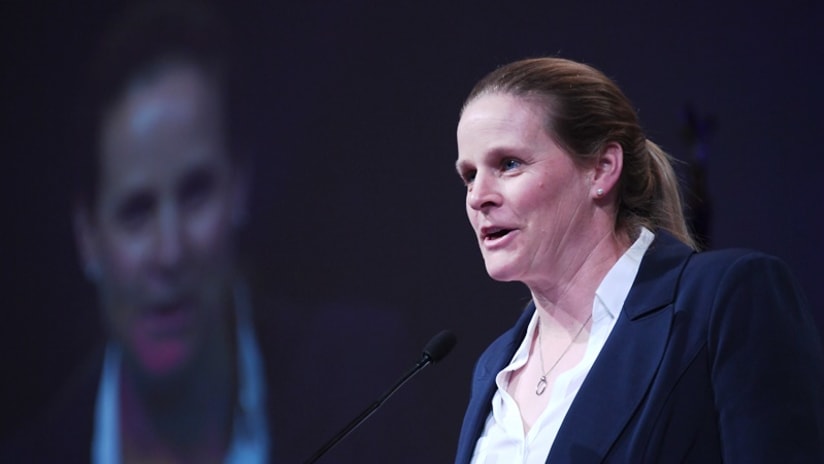There was an extended apology to Black Americans and other people of color from new president Cindy Parlow Cone and a few news tidbits in a US Soccer board of directors video chat meeting Saturday in the wake of the federation’s repeal of its controversial policy requiring national team players to stand for the playing of the national anthem at matches.
“I want to again personally apologize to all Black people, as well as other minorities, for us not being leaders in this fight,” said Cone at the outset of the meeting, which ran slightly over an hour. “I want to affirm that your experiences in our country are real, that I hear you, that I see you and that I believe in you.
“Repealing Policy 604-1 was just the first step. We will continue to engage with our players, our staff and soccer stakeholders to help us be a positive force for change going forward.”
The dramatic shift in the national conversation in the wake of George Floyd’s murder was reflected in other ways, as USSF announced it will launch a “diversity, equity and inclusion council” along with related initiatives in that space. The conclave also confirmed U.S. Soccer will run substantial financial deficits for the 2020 and likely 2021 fiscal years as the repercussions of the global COVID-19 pandemic took their toll, with uncertainty about the full extent of the damage expected to linger for months to come.
“I've been on the job now for just over two months,” said new CEO Will Wilson. “It's been a challenge starting this role in the midst of a global pandemic. Obviously it's had an effect on everyone, not just unique to us at US Soccer. The general fear and uncertainty around COVID, all of us working from home and adjusting to shelter in place, adjusting our lives accordingly, being concerned about our friends and relatives, these are truly unique times.”
Saturday’s meeting also featured updates from sporting director Earnie Stewart, national team general managers Kate Markgraf and Brian McBride and reports on Concacaf and FIFA proceedings from former USSF presidents Sunil Gulati and Carlos Cordeiro.
McBride said the men’s technical staff is ramping up to evaluate the national team pool and build player profiles as club leagues return to play in the coming weeks, noting “we're looking forward to the possibility of scouting so many games, and our players, in such a short period of time.”
Stewart revealed youth national teams with upcoming World Cups are expected to return to action in October, including the Under-23 men’s side looking ahead to the postponed Olympic competition set for next year, as well as the U-20 and U-17 sides. (On another front, the 2020 U.S. Open Cup remains postponed, with no further developments.)
McBride said the extended MNT staff is using online meeting technology to keep in regular contact with youth national teamers, including online conversations with legends Tim Howard and DaMarcus Beasley for the U-20s.
Echoing media reports making the rounds of late, Cordeiro said Concacaf is unlikely to hold the Hexagonal stage of World Cup qualifying for Qatar 2022.
“Almost certainly the Hex that we know, the six-team competition, I think that's very unlikely to happen,” he said. “A lot will depend on how many windows, FIFA windows, we have. I think FIFA might give us some more windows, but that aside, we don't really know when it will be safe to play … More than likely, it'll be some sort of group format in what remaining time we have. Both the men and the women are likely to get some additional windows next year to make up for lost playing time this year, but that may come too late for the men’s qualifiers.”
Cordeiro said Concacaf expects to vote as a bloc when FIFA elects the host nation(s) for the 2023 Women’s World Cup later this summer; the joint Australia-New Zealand bid narrowly edged Japan for top spot in the technical assessment and looks like a slight favorite to get the nod over their Pacific rim counterparts, with Colombia also in the running.
Gulati alluded to proposed changes in FIFA’s international eligibility rules to be tabled when that organization holds its next Congress, likely in an online format, and hinted some of the adjustments could be relevant to the United States and its hefty pool of dual-eligible players.
“There's some pretty significant, in some cases word changes, in other cases some rule changes, on nationality and eligibility to play,” said Gulati, a member of the powerful FIFA Council. “We should look at those pretty carefully for U.S. Soccer.”














